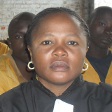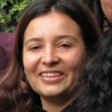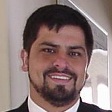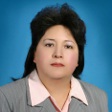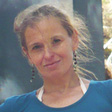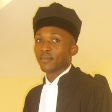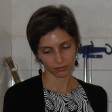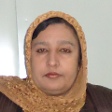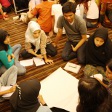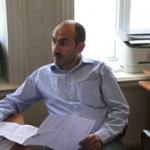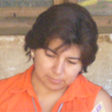2011 JusticeMakers Fellows
|
|
Access to legal representation in BukavuJustine Mwanaisha Saidi (Democratic Republic of the Congo) is responding to the problem of denial and delay of access to competent legal representation for accused poor and vulnerable youth in the city of Bukavu by collaborating with the police and prison officials and implementing seminars to raise awareness. She also plans on raising the number of lawyer volunteers to provide early access to legal counsel for women and children accused of crimes. Read More |
|
|
Legal representation to young victims of abuse and arbitrary detentionAdriana Patricia Castaño Roman (Colombia) is providing direct legal representation to young victims of arbitrary detention in the city of Medellín. Her project will include legal training for criminal defense lawyers to enhance their skills, representation of cases, the provision of support to victims of abuse and arbitrary arrest, documentation of cases handled that will be published in an effort to increase transparency regarding such practices, and rights awareness trainings for youth. Read More |
|
|
Access to counsel via video communication in ChileAlejandro Tomas Vianda Ovalle (Chile) is improving access to counsel to juveniles in Chile by providing them with the opportunity to have direct access with their legal counselors via video communication. This is in response to the denial or delay of access to competent legal representation for accused juveniles. He plans on achieving this by creating collaborative events among legal sector participants. Read More |
|
|
Legal representation for women prisoners in BoliviaVerónica Marisol Quiroga Pando (Bolivia) notes that the right to defense is often denied to citizens in Bolivia due to the fact that there are very high crime rates, extreme poverty, and a lack of allocation of resources given to public defender offices. The systematic denial of access to counsel is even more serious for women, who are often unable to obtain criminal defense lawyers due to existing cultural norms and persistent stereotypes. The Project seeks to provide legal representation for women prisoners – and to ensure access to justice from a perspective focused on gender and human rights. Read More |
|
|
Reducing the problem of HIV/AIDS in prisons in ArgentinaGabriela Eugenia Vázquez (Argentina) is strengthening the institutional structure of prisons within Argentina to help raise HIV/AIDS awareness and reduce the problem of HIV/AIDS in prisons by engaging the security professionals and criminal unit to help with prevention as well as strengthening the counseling unit within prisons. Ms. Vázquez will conduct counseling sessions on internal health, where safe sex practices are promoted to help prevent the spread of HIV/AIDS in penitentiaries, as well as engage with the security unit in the prison to help reduce the instances of HIV/AIDS among the prisoners. Read More |
|
|
Improving communication in Cameroon’s judicial systemGautier Zomissi (Cameroon) is improving communication between the various actors in Cameroon’s judicial system to ensure that prisoners are no longer unlawfully incarcerated past their sentenced terms, as well as increasing the speed of prosecutions, by creating an intelligence office which will coordinate prisoners’ files and facilitate communication between different judicial actors. In addition, he will also create a hotline in partnership with the government which will allow inmates to obtain urgent assistance or information they need which relates to processing their case. Read More |
|
|
Helping abused victims in ParaguayMaría de la Paz Martínez Irigoitia (Paraguay) is working to eliminate abuses by police and prison officials by organizing a collaboration between criminal public defenders and medical schools in the region to tend to abused victims. She intends to have the physician treat the victim and issue a medical report while the defender can report on the abuse and the human rights it has breached. This is in response to the lack of collaboration or common understanding among the various legal sector participants. Read More |
|
|
Expanding female prisoners’ knowledge about their rights in AfghanistanMahfuza Folad (Afghanistan) is providing direct legal representation to accused woman as well as expanding female prisoners’ knowledge about their rights and responsibilities within the Afghan criminal justice system by representing 14 accused indigent women in Kabul, providing 12 days of criminal justice training for accused women, and creating and publishing 1,000 “Know your Rights” brochures that will be distributed to the accused and other actors in the criminal justice system. Read More |
|
|
Legal empowerment for people living with HIV/AIDS in IndonesiaAlex Argo Hernowo (Indonesia) is attempting to combat the discrimination and stigma associated with having HIV/AIDS in Indonesia by providing legal services for people living with HIV/AIDS, conducting community legal empowerment in specifically targeted groups to train individuals to become paralegals to better assist the communities’ criminal defense needs, as well as produce educational tools for communities regarding law and human rights issues related to individuals with HIV/AIDS. Through these programs, he hopes to empower and education individuals living with HIV/AIDS so that they can better protect themselves against illegal treatment and discrimination. Read More |
|
|
Medical assistance to prisoners with HIV/AIDS in AzerbaijanElchin Abullayev (Azerbaijan) is increasing public attention to prisoners suffering from HIV/AIDS in addition to increasing the possibility of giving medical assistance to those prisoners with HIV/AIDS as a result of the rapidly spreading epidemic of HIV/AIDS in Azerbaijan. Furthermore, Mr. Abdullayev plans to strengthen advocacy for prisoners who are suffering from HIV/AIDS to ensure that they get proper medical attention as well as promoting early release for those prisoners who have HIV/AIDS. Read More |
|
|
Defending the rights of pretrial detainees in BoliviaMabel Jenny Antezana Arispe (Bolivia) plans to organize a group of volunteer attorneys to train both detainees at San Sebastian prison in Cochabamba, Bolivia, and the lawyers that represent them on human rights and criminal procedure. This will allow the attorneys to exercise their skills and legal capacity to defend the rights of pretrial detainees. The trainings will also raise awareness amongst the accused of the human rights protects they are entitled to. Read More |
